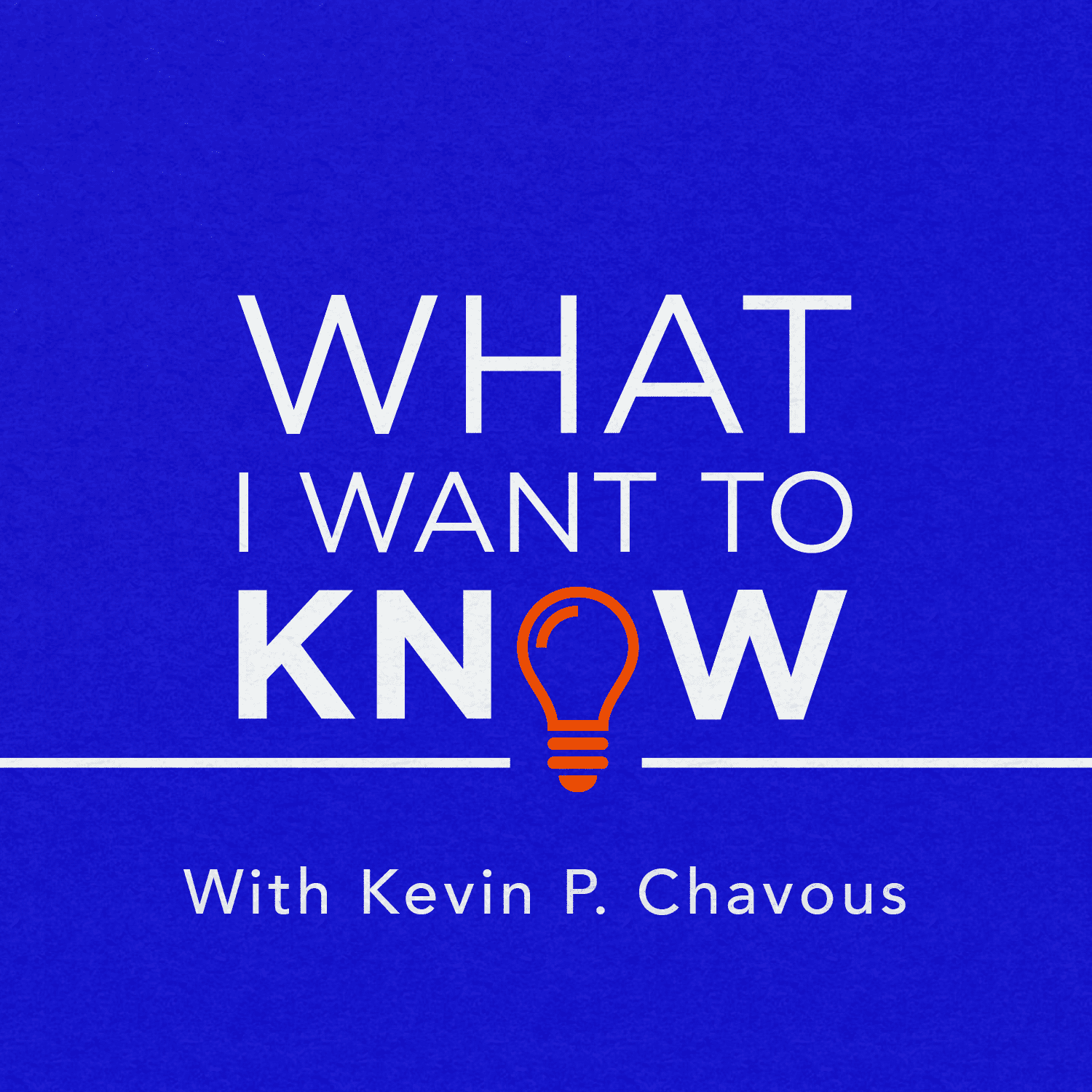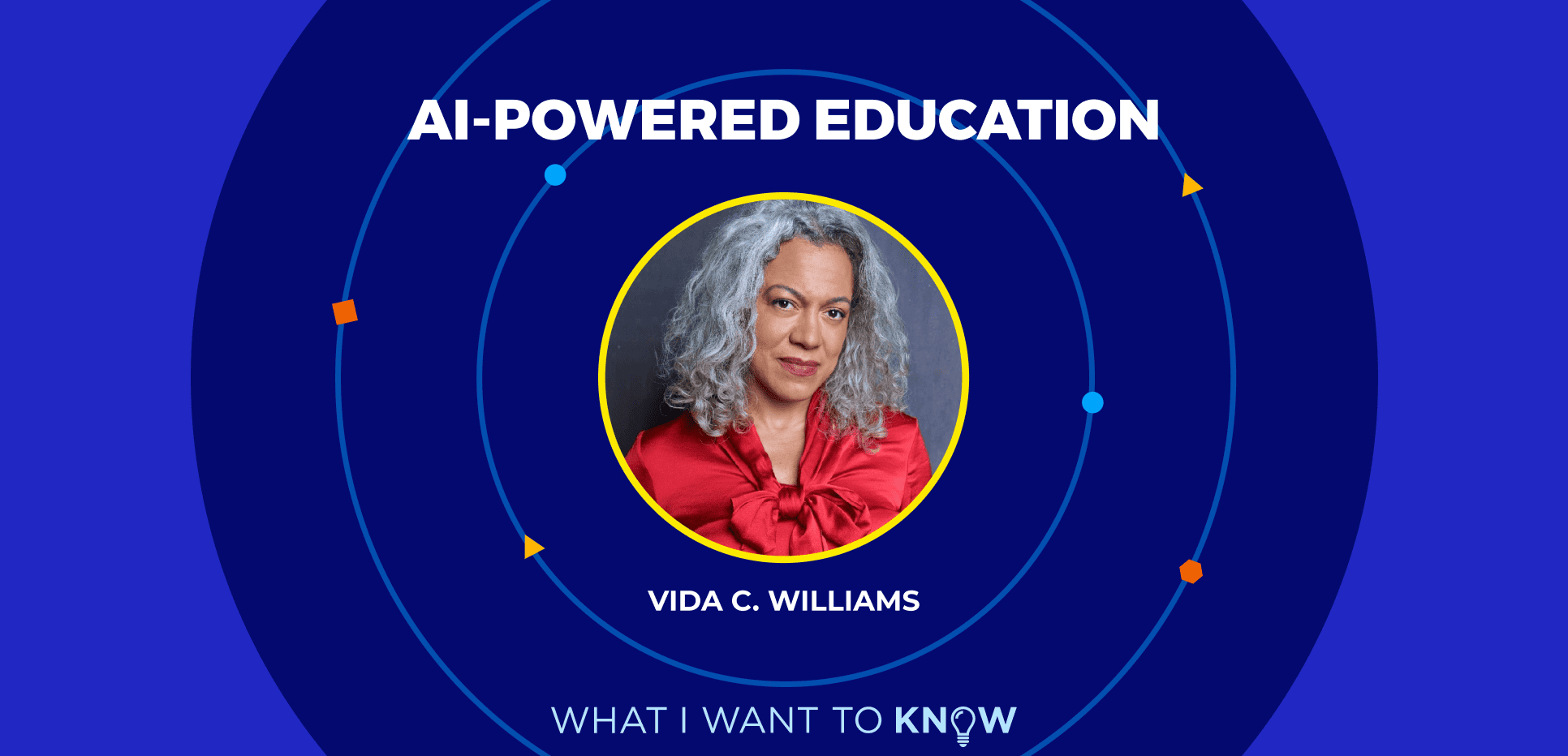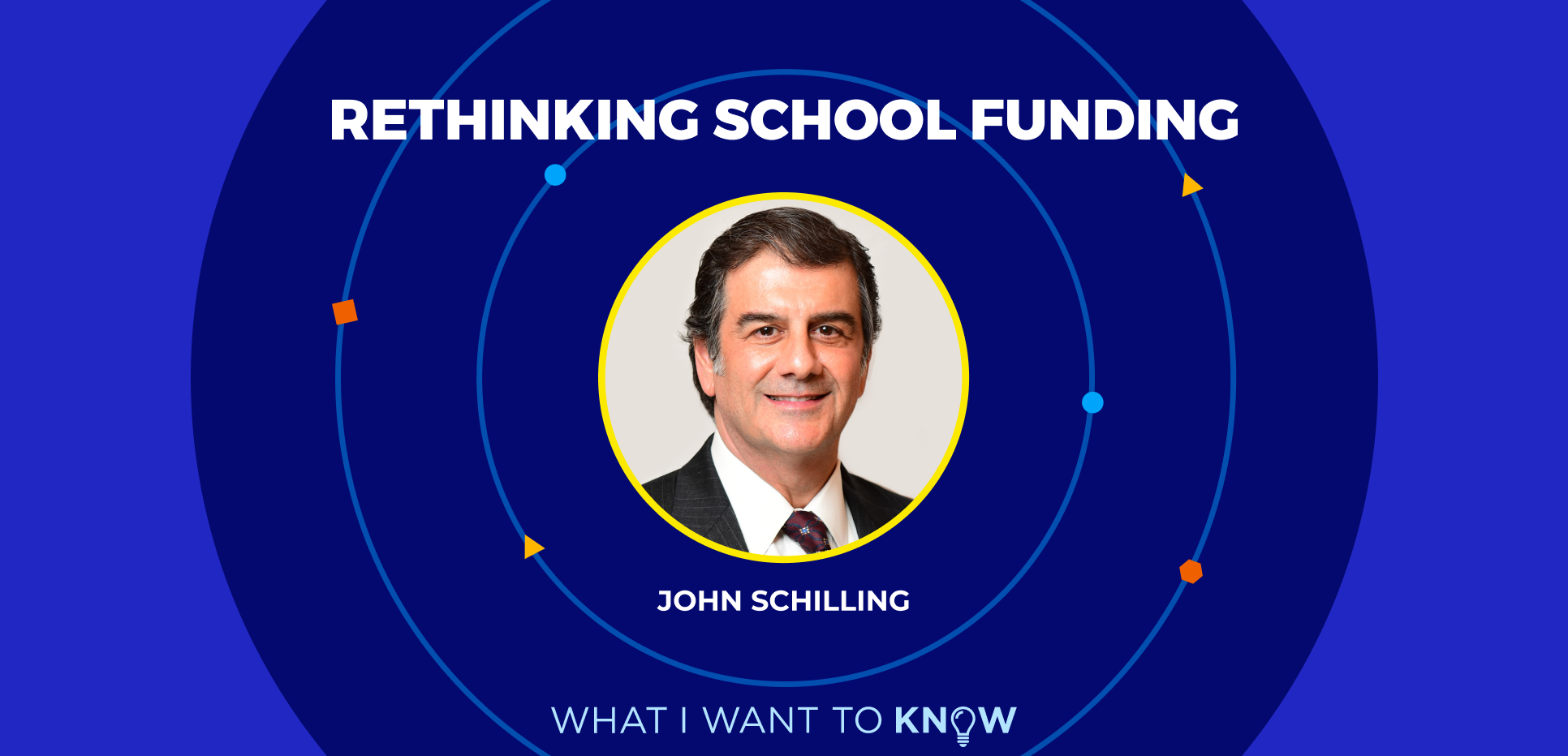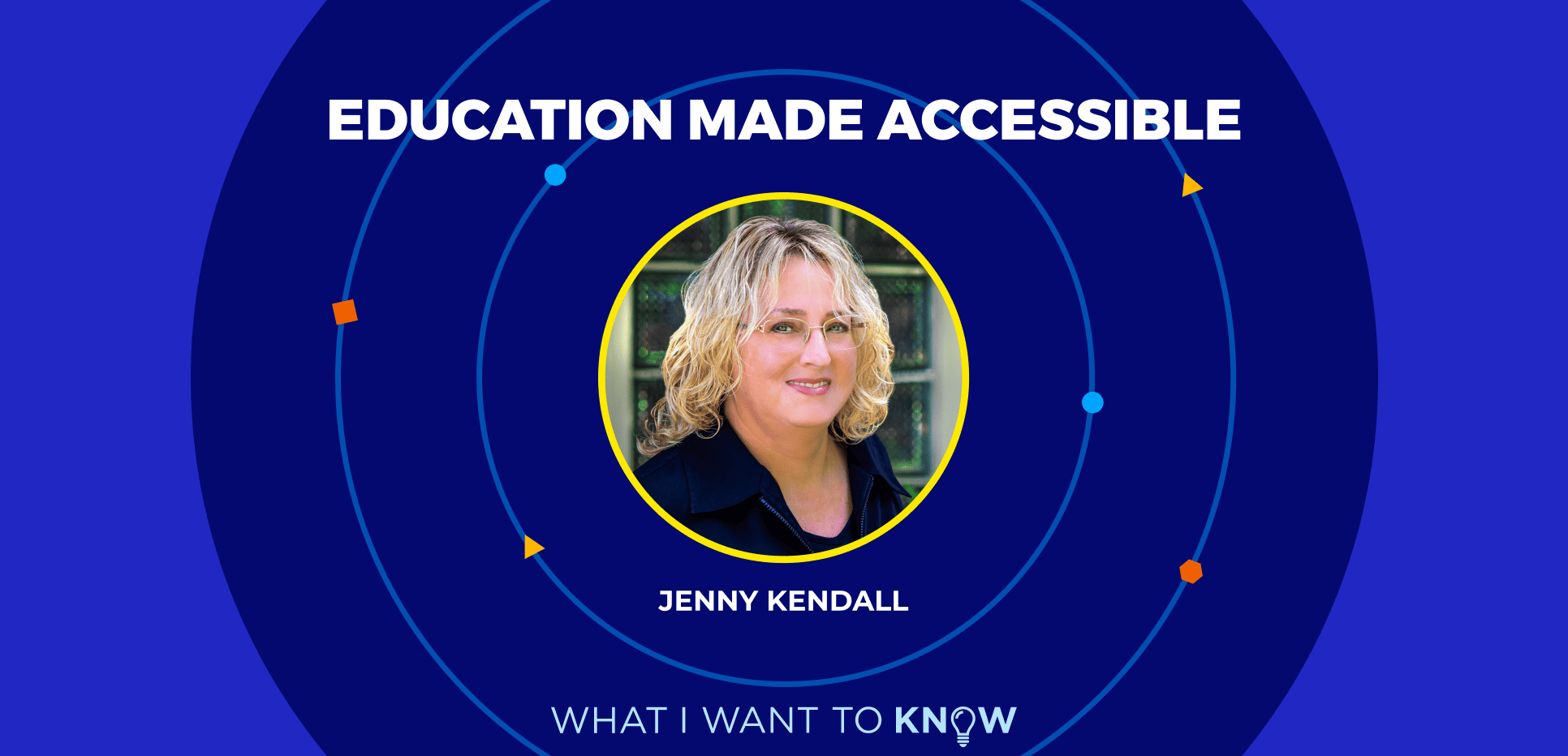The pressure to figure out life after high school can be overwhelming for students. But with the right tools, they can discover their strengths—and find the path that fits them best.
How do we help students connect their passions to real opportunities?
Allison Danielsen, CEO of Tallo, joins Kevin in this episode to talk about helping young people explore careers, build confidence, and make informed decisions about their future.
Listen to the Full Audio
Listen on: Apple Podcast, Spotify
Transcript
ALLISON DANIELSEN: We’re really working on building a digital career co-pilot that takes young people from career uncertainty to confident action in this process.
Kevin P. Chavous: College scholarships, careers. Most students have no idea where to start. The system is complex. The advice is outdated, and too many young people are left guessing.
Allison Danielson wants to change that. She’s the CEO of Talo, a platform connecting students directly to schools, scholarships and employers without the noise. How do we guide kids to make big decisions with more clarity and less stress? This is what I want to know.
Alison, first of all, uh, thanks for being here. Uh, I’m excited about your role at Tallow and I want to get into that, but talk about life before tallow. I. What was your career journey, uh, and how did you get involved in education generally?
ALLISON DANIELSEN: Yeah, it’s a great question, and I think this is one of the challenges that we’re trying to tackle here, is that my career journey was anything but linear.
You know, my first job was working at a poster stand in the mall. I had every other part-time job you could imagine. After that, I worked at Walmart, I worked at the bowling alley. I worked at Blockbuster. But really my first job in education came when I became a student advisor at Kaplan Test Prep while I was in college.
And I really caught the bug of trying to help individuals figure out what they could do with their lives and be prepared for all of the steps that they needed to take, including high stakes testing and the education pursuits they wanted to go down. Uh, and from there I realized, which I didn’t actually know before.
That there really was a lot of opportunity through the corporate ladder, and that’s something else we hear from young people is that until you’re exposed to it, you don’t really know that it’s there. And I had planned to go a different direction. In fact, I was studying art therapy and I loved the work in education so much that I ended up moving up through management, uh, had large operational jobs.
I managed a team of 3,600 teachers. Which taught me a lot about management, um, and recruitment, because we had to recruit about a thousand teachers every single year, and that was an amazing experience. Uh, I then worked, actually moved down to Florida for an opportunity in call centers, and that was a different experience.
And so I felt like I got a diverse set of opportunities. And then I actually moved on, uh, to work in consulting. And so I had worked with large organizations like A A RP. On corporate training that they were rolling out and different kinds of initiatives. So I got to see another side of this professional development work.
I helped small businesses and then ultimately ended up back in the full-time workforce, uh, working for college board where I was asked to come on and build a career exploration product in partnership with Roadtrip Nation that was gonna leverage the data from the SAT to help people make good choices about what was next.
And I did not know. Until I got into that work, how big the problem is. Yeah. In helping people see the opportunities, understand how they connected to those opportunities, whether they were ready for them, and ultimately to get them on a path to pursue those possibilities. And that work actually led into larger set of work at the college board and developing those tools inside a core advising product they had called Big Future.
And so my work for about six years at the college board, uh, reached about 15 million people. And we helped take the information connected from the SAT, which really measured your math and reading skills. It was a skill assessment in a lot of ways and a signal to colleges and use that as context for people to do more career exploration.
And so the opportunity to come to tallow. Came, uh, fell in my lap really. Uh, and I had known Talo for a long time in the space. Was so excited about the work they were doing, able to connect employers more closely to the process, a long history of success. And so when I was invited to take over the CEO role, I was really excited about the possibilities to move here and really to solve the same problems that I had become passionate about over time from a different angle.
And a different seat.
Kevin P. Chavous: You know, I actually think it’s good that your career path was not linear. Uh, far too often and far too long. For far too long, we’ve had, uh, folks involved in education who. That’s all they know. Yes. And I think having this different diverse experience is really, really important. Um, let me jump in for a quick moment.
For a lot of students, the traditional model just isn’t the right fit. That’s why more than 3 million families have chosen K 12 power schools, offering flexible tuition free learning options with certified teachers and a personalized approach. That meets learners where they are. If that sounds worth exploring, you can head to k12.com/podcast.
Alright, back to the conversation. The other thing you said, which, uh, of course it it dovetails nicely into to, to discussion about Talo, is that it’s an overwhelming process and it’s crazy what our kids are facing. When you think of the notion of. College or scholarships or careers. And you know, you’re talking about 16, 17, 18 year olds trying to make this decision.
And, you know, we’ve had shows on this. Um, some of the high school counselors, uh, just really aren’t. Up to it. Uh, and they’re using methods that have been used that were, uh, helpful I guess 20, 25 years ago. So, so talk a little bit about why the process is so overwhelming. You’ve had a depth of experience in this, but every family who has a kid who’s been through high school, they see it firsthand.
Can
ALLISON DANIELSEN: Yeah, I think it is way too stressful. I think there’s a few things that go into it. One is we put an overwhelming amount of pressure on young people to decide what’s next for them with this idea that it’s supposed to determine their entire future. If I made choices at 17 that stuck with me, I would be a full-time artist.
I would be a professional bowler, and I would probably not be making any money. It would not have been the right career path for me, and in fact, I’m able to pursue those things part-time because I have a career path that I’m passionate about, that I love, that gives me sustainable life. Um, and people don’t realize that they can do that.
They don’t realize they can pursue their passions in a lot of different ways, and they don’t realize that one choice in their lives about what they do after high school does not define their entire future. They also don’t see different pathways to success outside of traditional college as elevated or valuable.
We don’t know enough about the quality pathways there to give them advice. The people that they get guidance from. Aren’t familiar what’s happening in the labor market today. In fact, families are the number one influence on young people, and many of them think about jobs that people do with their hands or manufacturing or trades in an outdated way.
Yeah, and we know the modern career and technical education pathways are totally different and technology is a core part of a lot of that work, but it’s not easy to see unless you spend your time in it. So I think there’s, um. Really a lot of pressure in this idea that, you know, once you make a choice, you won’t be able to pivot.
When we know it’s not the case and the guidance that people get really is incomplete or from a set of value judgements that aren’t consistent with building a good life or the opportunity set that is emerging in America.
Kevin P. Chavous: Yeah. And I think you’re absolutely right. It’s, it is no doubt about it that there’s this buildup if you’re a student in high school and the thinking, wow, I’ve gotta decide what I’m gonna do with the rest of my life.
And it is couched in those terms the rest of my life. Yes. And the reality is. Especially today, more so than 20, 30, 40 years ago. But especially today, you know, very little of the career paths of young people is linear to, to go back to your experience and it’s okay to, uh. Move around a little bit, experience different things, and it’s even more okay or fashionable as, as many young people are doing to take a gap year.
Even in medical school or in law school or graduate school, you know, uh, admission. Uh, folks like the fact that students take a gap year, whereas. 30, 40 years ago was frowned on. As we talk about solutions to this, how does Talo fit in? Talk a little bit about Talo and why that, and the, that company and the work you’re doing helps pave a path toward better clarity, not just for students, but also for parents.
ALLISON DANIELSEN: Yeah, we are really working on building a digital career co-pilot that takes young people from career uncertainty to confident action in this process, and it stays with them from 13 to 30 because in fact, most people don’t have a linear career path. I’d actually ask anybody listening to this. So think about what did you wanna do when you were 17 and are you doing that thing?
Did you know that your job existed? Yeah. So we believe that we can help people through the entirety of this career development process. It’s a digital platform. We have nearly 2 million users, and it’s free for anybody to come and sign up. And we take people from exploration and discovery so they can see more than 1800 career paths into learning and earning credentials of value.
We more than a hundred thousand courses available to connect to on the platform, and ultimately we connect people to jobs that help them build a better life. And we have community resources. We bring employers and other high quality organizations and educational institutions like colleges into the conversation directly with young people so they can get accurate, up-to-date advice from a diverse set of sources.
And we really are there for them through the entirety of this process, because you’re not gonna do it once. You’re gonna come in and out of this experience in lots of different entry points, and you need somebody with you the entire way. So that’s what tallow is about. Uh, that’s the problem that we are solving and we’re continuously fo focused on building a product that is actually something that young people want to use, not a product that young people have to use.
Kevin P. Chavous: Yeah. You know what’s interesting about that? I remember when I was first introduced to Talo and, and, and the work they did, uh. That even the simple idea of helping a young person build a resume, uh, yeah. And, and, and a profile of who they are. Uh, it, it was a huge, huge, uh. Eyeopener for so many students because it, it, it got them conditioned to think about themselves and selling themselves in a different way.
Don’t you find that to be the case?
ALLISON DANIELSEN: Absolutely. One of the problems that we see is that young people actually aren’t able to identify or articulate the skills that they have, and they don’t even realize where they pick up these skills and abilities or the potential that that could translate to. I have a young person in my life, my friend’s daughter who’s 18, and she messaged me.
Panicked in the middle of the night two weeks ago and said, I can’t be a waitress forever. What am I supposed to be doing with my life? Do I go into education? Do I get into a trade? This was keeping her up at night. She had no idea what she was supposed to be doing, and I think it’s hard for young people to find guidance, but the thing that struck me was that she actually thought she wasn’t building a single skill as a waitress that looked to her like a dead end, and in fact.
The best hire. One of the best hires we’ve made at Tallow over the last year is an individual software developer who started his career in restaurants, and then he went into a bootcamp with Tuck Elevator, got all the technical skills for software development, and then as he’s come into the role at Tallow.
Boy, this is a person who does not sweat under pressure. The things that you learn in a restaurant allow you to prioritize what’s actually important, work calmly in tense situations, and really just keep things going. And so his experience there is incredibly valuable, I think, in making him such a good employee Now.
And I wish we could help young people better understand what it is that they’re developing and learning, and then offering them a place to show that to people, to become discoverable, to be seen for all of the different abilities and potential that they actually are bringing to the table.
Kevin P. Chavous: So tell me what you think about this, because I’ve developed my own.
Theory over the years. Um, and by the way, that’s how I developed a gray beard, just so we’re clear. Uh, but I’ve developed my own theory that today’s young people are actually more, they learn differently, and tallow works for them largely because. This generation of young folks, they’re more used to doing as opposed to being told what to do.
And if you’re able to, early on in the process, identify your strengths and your challenges, and you have some understanding as to how to engage in outreach. And, you know, reach out to four or five different companies and, and you’re armed with the right language during that outreach, then, then that’s a step ahead of previous generations, largely because of the digital concept.
And, and so don’t you find that today’s kids, they’re learning differently, they understand the virtual online world, all those things and the work that you’re doing at Tallow play into a developmental approach that, that serves them far better.
ALLISON DANIELSEN: Yeah, and I think they’re also used to different kinds of stimulating experiences, right?
As we think about offering them tools in this space, we’re competing against time that they’re using on social media in apps like TikTok. Yeah. Not in education technology tools that they’re in maybe day-to-day in their school. Right. That’s why we have to make sure this process is engaging, and we also find that that experiential learning is so critical because it’s not just about.
Figuring out what you’re good at or developing skills, it’s actually important early on to figure out what you don’t like.
Kevin P. Chavous: Yeah. Oh yeah. Oh yeah. ’cause if you
ALLISON DANIELSEN: can knock that out of the, uh, consideration set, you are in a better position. I think. Um, you know, there’s a, a leader in the education space, Amy Lloyd, who said once that, um, college is a really expensive career exploration activity.
So
you could
ALLISON DANIELSEN: imagine you land on campus and you’re gonna spend a hundred thousand dollars plus to get this education. And if you are not sure what that is in service of. We probably failed you earlier in the process. And so we wanna give people the opportunity, not just to experience the possibilities, to see how their strengths, um, really can develop, but also what they like and where they can thrive.
And we need to do that in a way that gets them engaged and competes against the other things that have their attention, not just. You know, the, um, a lot of the tools that, I mean, I think you mentioned this, people have been using for 20 or 25 years that maybe aren’t stick or engaging for young people today.
Kevin P. Chavous: Yep. So, Allison, look, um, I I think that, uh, it’s time for a different approach. I think that tallow is a company’s time has come and many parents are listening. Some students will be listening. So we’re gonna try something different. I’m gonna put on my game show host hat. Okay. This is time for a rethink.
And as I said, you know, you, you’re not gonna be graded, but I, I, I, you have the option of, of giving an answer that this sort of old school way of thinking, this the statements I’m gonna give, either they’re true. Or we need to rethink it. It’s not true. Okay, so you, you ready to go? I mean, again, you’re, you’re gonna do fine, but, uh, I’m the one that’s doing the grading, so you’re gonna pass this.
This is the first statement. Scholarships are only for top athletes or straight A students. True. Or Rethink? Rethink it. Rethink. And why?
ALLISON DANIELSEN: Rethink because we see that there are tens of thousands of scholarships available for all educational pathways, all different areas of academic focus, all different kinds of accomplishments.
And in fact, that’s why on Tallow we have more than 20,000 scholarships that are vetted, listed, available for, for young people, and half of them are for people outside of a four year degree. A third of them are focused on professional certifications, and in fact, many are about other kinds of strengths and assets.
That young people have, perhaps their interest in robotics, perhaps interest in a different kind of field art that they might be passionate about. And there really are a lot of opportunities out there that I think people don’t know exist.
Kevin P. Chavous: Yeah, and I think that that’s why I read this one first. I’m amazed at how many students.
Automatically disqualify themselves in their own mind because they’re not a top athlete or an A student. And you’re absolutely right. There are a lot of scholarships out there. Alright, here’s the next one. A degree from a big name school is always worth more than one from a smaller school. True. Or rethink?
ALLISON DANIELSEN: Rethink. I think what we’re seeing in the evidence is that a degree that serves you with critical thinking skills. Technical skill development in the field that you’re interested in is gonna be more valuable. There’s been a lot of studies about the area of focus in your education over that elite name.
Yeah. And where you can get more experiences. The experiential learning that we discussed about exposure to different kinds of people, and really a place where you can figure out what lights you up, that’s gonna be the, the thing that serves you best in your career, if that’s at a big name. Great. But if it’s at a state institution, a community college, a trade school, a technical program, all of those things can provide a lot of value to young people and they need to figure out what’s best for them.
Kevin P. Chavous: Yep. Alright. What about this one? Digital portfolios and online and an online presence can open real doors for students.
ALLISON DANIELSEN: I think that’s absolutely true. And that’s a place that we’ve really leaned in over the last, uh, 13 years that Talo has been around. This idea that everybody has a talent, a skill and ability potential to be successful.
And we just need to make that connection. We need to help them be seen in the process and there is nothing better. Then the digital opportunities that emerge. There’s more work from home opportunities than ever. There’s more virtual education pathways that people can tap into, and there really are a ton of employers and opportunities in the workforce that people did not know existed that are now accessible through digital connections.
Kevin P. Chavous: Yep. Now this is a good one. Your GPA matters more than your portfolio passions or personality. True. Or rethink?
ALLISON DANIELSEN: Rethink. I think this is a place where, especially early on, many people feel like they need to do things like put GPA on their resume. And in fact, employers don’t actually care, uh, about that.
They care about the skills that you bring to the table. They care again about that potential, the way you’re gonna approach the work. There are places where a credential matters like a college degree, but that’s the outcome you’re after. It’s not your grade while getting there. So I would encourage young people to really focus on not what is the grade I’m getting, but what am I gaining out of this, and how do I make sure that that creates.
Opportunities for me in the future. Employers are not gonna look at your GPA and in fact, I certainly would advise people, uh, after a couple of years outta school to not even include an indicator like that.
Kevin P. Chavous: Alright, here’s the last one. True or rethink. There’s no single path to success anymore.
ALLISON DANIELSEN: Uh, I believe that that is true.
I think that the pathway to success is personal. It’s gonna depend on what you like, what you’re ready for, what is available to you, right? I mean, not everybody is actually going to want to live in specific places. They may have to stay at home, take care of a family member. They may love where they live, or they may want to get to a different place.
And work is really varied throughout the country. I think that’s something that is also not obvious to people, that in rural areas you may find more, uh, density of agricultural opportunities that exist. You may find in Northern California that you have a density of technology opportunities that exist.
And this happens really all over the country. Work is very local. And so you need to understand who are you, what do you like, and what’s actually out there that will help you meet your needs.
Kevin P. Chavous: So Alice, this has been terrific. Uh, one last question. Uh. So for a student who’s entering their junior year, what should they do to get started to begin this process?
I.
ALLISON DANIELSEN: Yeah, I think they really should. My advice would be to actually sit down and create an account at Tallow, because we can help guide you through that process. We’ll give you an opportunity to understand what are your interests, to take a quick assessment to do that. We’ll give you 30 career matches, would encourage you to look more deeply at what those actually look like.
You can then look at the courses and jobs that are connected to those opportunities, and I’d encourage you to build a plan. I’d also encourage you to reach out to people in your network and ask them about their work. What do they do? What do they like, what do they hate? And you can learn more about not just what are those potential career pathways, but also what do they look like in real life.
Yeah.
ALLISON DANIELSEN: And um, that is incredibly important. And it also builds that skill that you mentioned before, which is talking about yourself and talking about your career pathways that is important for you, your entire life, if you get that skill early. You will be more likely to be successful. Your networks matter almost more than anything in this process.
So I would encourage people to get started out there, really start to explore the possibilities. T is a free tool to do that if there are other places they wanna go. I think just getting started and asking questions is incredibly important. And you know, I think. Most people actually even aren’t starting as a junior in in high school at this point.
Like we’re finding people even much earlier are starting to think about their career pathways. And one other note on that is, I would just say don’t assume that the decision that you make now locks you in for what you’re gonna do for the rest of your life. Yeah. Again, I would be sitting here doing very different work.
I never thought I would be in a CEO position. Uh, I never took a business class. I never took an education class, and in fact, I learned so much through my work that I feel like this is the perfect fit for what I’m able to do, and I couldn’t have imagined it when I was 17.
Kevin P. Chavous: Alison Danielson, uh, keep doing what you’re doing.
Thank you for all you do at For Kids and at Tallow, and thanks for joining us on what I want to know.
ALLISON DANIELSEN: Thank you so much for having me.
Kevin P. Chavous: Thanks for listening to What I Want to know. Be sure to follow and subscribe to the show on Apple Podcast, Spotify or your favorite podcast app so you can explore other episodes and dive into our discussions on the future of education and write a review of the show.
I also encourage you to join the conversation and let me know what you want to know using hashtag WI WT K on social media. That’s hashtag WI WT K. For more information on Stride and online education, visit stride learning.com. I’m your host, Kevin p Chavis. Thank you for joining. What I want to know.
Meet the Experts
Meet Allison
Allison Danielsen is the CEO of Tallo, a Stride, Inc. company that helps students showcase their talents and connect with colleges and employers. She’s dedicated to ensuring every student has a clear, supported path forward.






